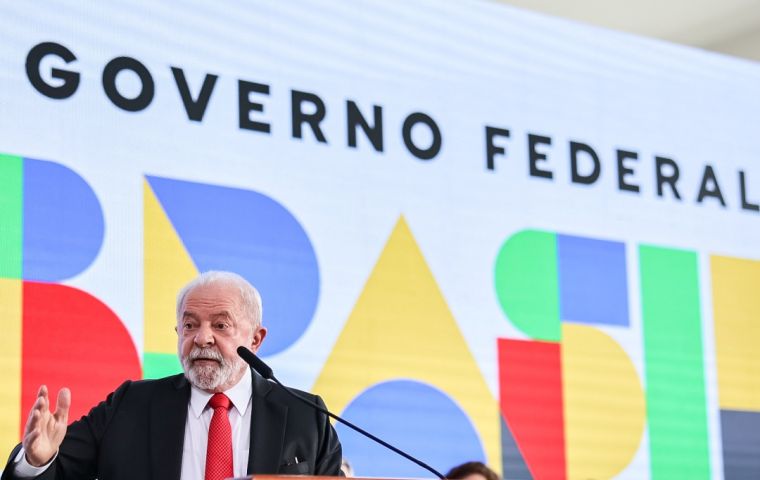MercoPress. South Atlantic News Agency
Lula, 100 days of government in Brazil
 Lula managed to “normalize Brazil's relations” with certain countries, which had been degraded during Bolsonaro's administration. Photo: Government of Brazil
Lula managed to “normalize Brazil's relations” with certain countries, which had been degraded during Bolsonaro's administration. Photo: Government of Brazil In the first 100 days of his government, President Lula da Silva did not exactly live a “honeymoon” with Brazilians, but a period with ups and downs, thirteen years after leaving power with record popularity.
The icon of the Latin American left returned to the Planalto Palace to govern a deeply divided country until 2026, after narrowly defeating the far-right Jair Bolsonaro (2019-2022).
Luiz Inácio Lula da Silva, 77, immediately got down to work: he reestablished social and environmental preservation programs, promoted policies to protect indigenous people, combat racial discrimination and normalize diplomatic relations after the period of international isolation promoted by his predecessor.
But the beginning of his third term was also marred by controversial statements and a confrontation with the Central Bank that increased the distrust of the market and the business sector.
Three months after his inauguration, Lula has a 38% approval rating, a worse performance than at the beginning of his first terms (43% in 2002 and 48% in 2007), according to a survey by the Datafolha Institute.
Although his popularity is better than Bolsonaro's after three months in power (32%), their rejection rates are practically tied: 29% disapprove of Lula and 30% did not like Bolsonaro.
Stones against his own roof
Just a week after Lula's inauguration, Brazilian democracy was put to the test: thousands of Bolsonaristas dissatisfied with the election attacked the presidential, congressional and supreme court headquarters in Brasilia.
For Denilde Holzhacker, political scientist at the ESPM marketing school, the leftist failed to take advantage of the feeling of unity aroused by the attack, when he received broad support from members of Congress, of a predominantly conservative profile.
“The spirit of that second week of government was lost, and divergences increased even more,” Holzhacker told AFP.
And Lula threw stones against his own backyard by stringing together a series of controversial statements.
For example, he hinted that a Federal Police operation against a drug trafficking group accused of plotting to assassinate Senator and former judge Sergio Moro - who convicted Lula in 2017 in the Lava Jato corruption case - could be a “set-up.”
This revived an opposition that was “demobilized after the January 8 attacks,” and which was further strengthened by Bolsonaro's return last week to Brazil after a three-month stay in the United States, Holzhacker assures.
Lula also multiplied his attacks against the president of the Central Bank, by demanding - so far without success - the reduction of the country's reference interest rate, today among the highest in the world (13.75%).
”Lula has his own way of talking and the market is very suspicious of him. But in fact he has reinforced more austere (economic) positions,“ says André Perfeito, an economist with the consulting firm Necton.
An example of this is the new fiscal regime that will be presented to Congress next week, which will make it possible to finance social spending without excessively increasing the public deficit.
”Difficult balance“
Among the main achievements of his first 100 days is the relaunch of the Bolsa Familia program, with an increase in the minimum value of social benefits for the most disadvantaged.
He has also been firm in deploying the Armed Forces to begin the eviction of thousands of miners illegally installed on Yanomami indigenous land in the Amazon.
In terms of foreign policy, the first 100 days brought a ”generally positive“ balance, according to Oliver Stuenkel, professor of International Relations at the Getulio Vargas Foundation.
Lula managed to ”normalize Brazil's relations“ with certain countries, which had been degraded during Bolsonaro's administration.
The leftist visited his peers in Argentina and the United States, and next week he will travel to China, after recovering from pneumonia that forced him to postpone his official visit.
But with the return of the South American country to multilateralism, ”it will be difficult for him to maintain a balance between the West on one side and China and Russia on the other“, warns Stuenkel, who recalls Brazil's ”unwillingness to adopt a more critical tone in relation to Russia” because of the war in Ukraine.
By Louis GENOT - AFP




Top Comments
Disclaimer & comment rulesCommenting for this story is now closed.
If you have a Facebook account, become a fan and comment on our Facebook Page!